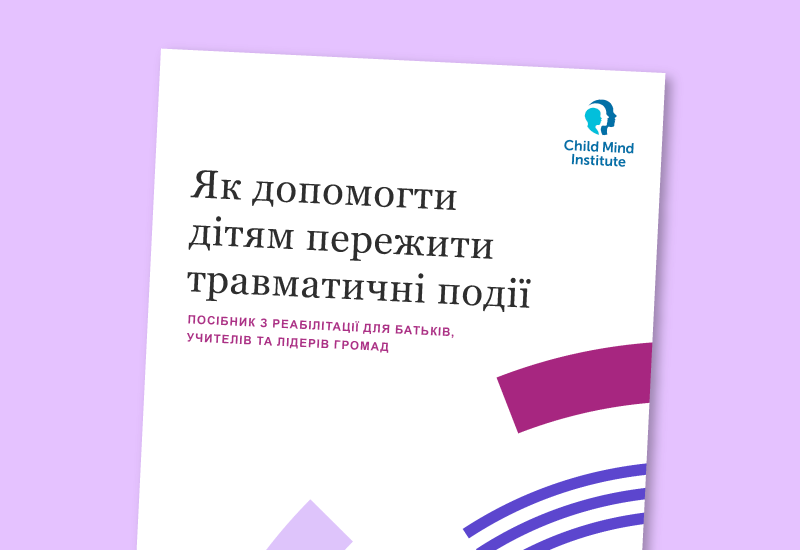From the International Society for Traumatic Stress Studies: “The CATS is based on the DSM-5 and is a measure of potentially traumatic events and of posttraumatic stress symptoms (PTSS). The CATS can be administered as a self-report or as an interview and is appropriate for pre-schoolers, children and adolescents. There is a self-report measure for 7-17 year old children/youth, and two caregiver versions; one for 3-6 year old children and one for 7-17 year old children/youth. The younger child version conforms to the DSM-5 3-6 year old PTSD symptom criteria. The interview format may be preferable with younger children or youth with reading comprehension challenges.”
Care
Mental Health Resources for the Ukraine Crisis
Instruments and resources to aid clinicians responding to children’s mental health needs during the crisis in Ukraine and Eastern Europe.
Multilingual Trauma Resources
We hope these resources will be of assistance in a trying time, and that you will share them with anyone you think might benefit.
About CATS
The Child and Adolescent Trauma Screen (CATS) was developed by Lutz Goldbeck, PhD, and Lucy Berliner, PhD. To aid clinicians responding to children’s mental health needs during the crisis in Ukraine and Eastern Europe, the Child Mind Institute has translated the CATS into Ukrainian and Polish language.
Download Instruments
Additional Resources
Talking to Children about the War in Ukraine: 15 Tips for Parents
New Facts for Families from the American Academy of Child and Adolescent Psychiatry (AACAP)
Плекання резилієнтності сімей під час війни та кризи (Ukrainian video)
IASC Guidelines for Mental Health and Psychosocial Support in Emergency Settings
This guide from the Inter-Agency Standing Committee reflect the insights of numerous agencies and practitioners worldwide and provides valuable information to organizations and individuals on how to respond appropriately during humanitarian emergencies.
Psychological first aid for Ukrainian people
From the Council of Europe’s Pompidou Group. The Pompidou Group, together with leading European psycho-trauma experts, has developed recommendations on how people can better interact and communicate with persons who have experienced a crisis or difficult life event. The recommendations were developed at the request of the Ukrainian Ministry of Interior and are available in many languages: English, French, German, Hungarian, Polish, Romanian, Russian, Slovakian, Turkish, and Ukrainian.
Psychological Self-Help in Crisis Situations (Russian language video)
Speaker: Hannah-Valeria Grishko LCSW
Maintaining Resilient Families During War & Crisis (English video)
Adult PTSD Self-Report Measures
From the US Department of Veterans Affairs
PTSD Checklist for DSM-5
From the US Department of Veterans Affairs
Maintaining Resiliency During War & Crisis
Part 1
Maintaining Resiliency During War & Crisis
Part 2
Coping with Acute Grief & Guilt During War
In this video we discuss the various ways of how acute grief and guilt shows up in people during war & crisis, and what people can do about it.
Tips For Parents During War Time (Article in English and Russian)
Author: Avi Tenenbaum MA
Learn More
Millions of children – as many as 1 in 5 – struggle with mental health or learning challenges. Fully 70% of U.S. counties do not have a single child and adolescent psychiatrist. Due to stigma, misinformation, and a lack of access to care, the average time between onset of symptoms and any treatment at all is over 8 years. Our children deserve better.
That’s why the Child Mind Institute was created.
We’re dedicated to transforming the lives of children and families struggling with mental health and learning disorders by giving them the help they need. We’ve become the leading independent nonprofit in children’s mental health by providing gold-standard evidence-based care, delivering educational resources to millions of families each year, training educators in underserved communities, and developing tomorrow’s breakthrough treatments.
Together, we truly can transform children’s lives.
We’ve assembled one of the finest teams of psychologists, psychiatrists, neuropsychologists, social workers, and speech-language pathologists in the country. Explore our directory to get a sense of their backgrounds, and why they choose to do what they do at the Child Mind Institute.

Helping Children Cope With Traumatic Events
Free, multilingual resources to help parents, educators and communities support children during and after potentially traumatic events.

